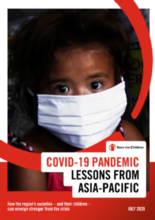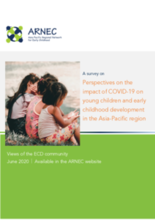Displaying 71 - 80 of 323
This study examined rural children’s well-being, particularly their physical well-being, as functions of parental absence, family economic status, and neighborhood environment.
This short essay presents unwed single mothers’ increased vulnerabilities during the COVID-19 pandemic in terms of childcare, financial crisis, and mental health.
This report looks at six crucial pathways that can not only help save lives and livelihoods but also lay the foundations for safer, healthier, more sustainable societies and a more promising future for children.
This study examines how childhood experiences of being left behind by migrant parents affect the behaviors of adults.
To explore the complex dynamics of parental migration on nonsuicidal self‐injury (NSSI), this study examined the roles of parent–child cohesion and socioeconomic status (SES) in the relationship between stressful life events and NSSI.
In this joint statement, Karin Hulshof, UNICEF Regional Director East Asia and Pacific and Maalla M'jid, Special Representative of the Secretary-General on Violence against Children express their support for the Joint Statement of the ASEAN Ministerial Meeting on Social Welfare and Development – Mitigating impacts of COVID-19 on vulnerable groups in ASEAN, which highlights the vulnerability of children, the need to reach them with both social protection and social welfare services and the essential role of social workers.
The purpose of this study was to longitudinally examine the effects of stigma on the development of children living in out-of-home care situations, specifically with regards to self-esteem and antisocial behavior.
"A court in Seoul ruled Friday that a woman adopted by an American couple almost four decades ago must be recognized as a daughter of an 85-year-old South Korean man," says this article from the New York Times.
The purpose of this study was to examine the mental health status and substance use behaviors of urban left-behind children and urban children still living with their parents in comparison to rural left-behind children.
This report presents the findings from a survey commissioned by the Asia-Pacific Regional Network for Early Childhood (ARNEC) to get insights and share experiences on the situation of children and the status of early childhood development (ECD) as a result of COVID-19 and the resulting containment and risk mitigation measures being implemented in countries in Asia-Pacific region.


